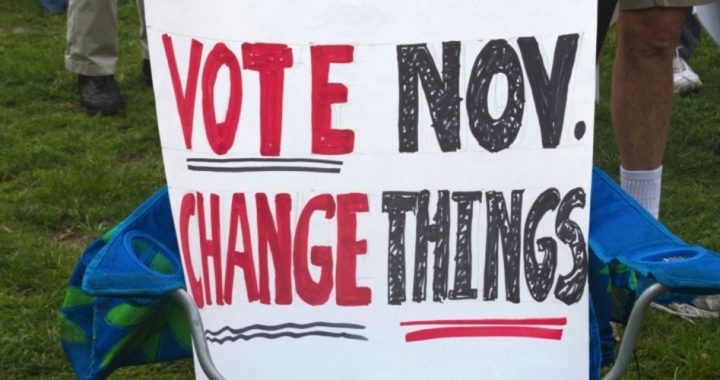
A recent Reuters/Ipsos poll indicated that voters who identify themselves as “evangelicals” are more enthusiastic than the general population about the midterm elections. Reuters noted that, despite the fact the influence of the “religious right” (or Christian Right) has declined since the days when Rev. Jerry Falwell’s Moral Majority exerted a strong influence on American politics, “Christian conservatives will probably vote in greater numbers on November 4 than others, giving them an outsized say in who runs Congress.”
A strong turnout by this overwhelmingly Republican bloc is seen as crucial to the Republicans’ chances of retaking the Senate in this election.
According to the poll, 49 percent of evangelicals responded that they have a great deal of interest or quite a bit of interest in news about the elections, compared to 38 percent of non-evangelicals.
Among those completing the poll, almost 40 percent of Republicans said they were born-again or evangelical Christians.
As Ipsos pollster Chris Jackson interpreted the data: “It strongly shows that the evangelical population is very engaged, very interested in what’s happening and much easier to turn out for an election than the population as a whole.”
The Christian Right received considerable national attention in the 1980s. Among the institutions named as being part of the movement have been the Moral Majority, the Christian Coalition, Focus on the Family, and the Family Research Council. The Moral Majority was an especially potent group lobbying for Christian values during the 1980s, and was identified as being “pro-life,” “pro-traditional family,” and “pro-moral.” Some analysts have credited the group with delivering two thirds of the white, evangelical Christian vote to Ronald Reagan in the 1980 presidential election.
Although its origins were mostly evangelical Protestant, the Religious Right coalition has broadened to include many Catholics and Mormons, who share evangelicals’ views on important moral issues such as opposition to abortion and same-sex marriage.
Many of these morally conservative Christians worked together on the front lines in the pro-life movement and came to recognize their common ground. An example of this cooperative effort was seen in the signing of the 1994 document Evangelicals and Catholics Together by leading American Evangelical and Roman Catholic scholars. Among the best-known signatories were Charles Colson, an evangelical Christian leader who founded Prison Fellowship and BreakPoint; Dr. Richard Land, who was president of the Ethics & Religious Liberty Commission — an arm of the Southern Baptist Convention; Cardinal Avery Dulles of Fordham University; and Father Richard John Neuhaus, founder of the journal First Things and unofficial advisor to President George W. Bush on bioethical issues.
While Republican politicians welcomed the support of the Christian Right during the Reagan years — and beyond — the poor showing of Republican candidates in the 2008 and 2012 presidential elections and the loss of the GOP’s control of the Senate in recent congresses has found many Republicans downplaying moral issues in an often fruitless attempt to appeal to “moderate” voters.
This was reflected in the Reuters report, which noted that “[evangelicals’ Republican] party loyalty is striking given that Republican candidates have largely avoided evangelicals’ pet topics like opposition to abortion and gay marriage for fear of alienating moderate voters in tight U.S. Senate races.”
“The candidates, certainly the Democratic candidates, are not talking about these [moral] issues and in most cases the Republican candidates aren’t talking about these issues, so we are going to talk about them,” Reuters quoted conservative political activist Ralph Reed, who is best known as the first executive director of Pat Robertson’s Christian Coalition during the early 1990s. Reed’s Faith and Freedom Coalition has launched what he describes as is its “most muscular” turnout operation yet. The campaign includes making ten million phone calls to potential voters and an aggressive ad campaign of online videos. Reed has described the Faith and Freedom Coalition, which he founded in 2009, as “a 21st century version of the Christian Coalition.”
Evangelical Christians are also looking beyond November to the 2016 presidential election. NBC News reported recently that conservative evangelical Christians have made it clear that support for traditional marriage is a prerequisite for any presidential candidate who hopes to win their votes in 2016.
“We believe that there are non-negotiable values, marriage being one,” NBC News quoted Bob Vander Plaats, identified as a social conservative activist in Iowa who endorsed and organized support for the last two winners in the caucuses there, Mike Huckabee and Rick Santorum.
Vander Plaats added, “It’s going to be more than a talking point, a lot of time in the past people have gotten by without saying much. Now, it’s going to be ‘what is your leadership strategy to ensure that marriage is upheld, one man, one woman for the benefit of the entire country?’”
Russell Moore, the head of the public policy arm of the Southern Baptist Convention, which includes congregations that have a combined 16 million members, recently predicted: “I don’t think you will see social conservatives supporting a candidate who will reject the traditional definition of marriage.”
Fox News host Mike Huckabee, who was a Baptist pastor and governor of Arkansas before running for president in 2008, expressed similar views on his program, Huckabee, saying that Republicans should “grow a spine” on the issue of judicial activism and same-sex marriage, adding that he was “utterly disgusted” with fellow Republicans for being too timid to address the issue.
“I’m utterly disgusted with fellow Republicans who want to walk away from the issue of judicial supremacy just because it’s not politically viable. Here’s my advice: grow a spine. Show a modicum of knowledge about the way we govern ourselves, and lead, follow, or get the heck out of the way,” he said
“I don’t think the GOP is going to walk away from the entire body of values voters — but if so, then there would likely be no place for me as a voter or candidate,” Huckabee said in an e-mail to Newsmax on October 9. “I wouldn’t be leaving them; they’d be leaving us.”
A report in Politico on October 20 observed that evangelical leaders understand that public opinion on social issues has changed since 2000 and 2004, when the Moral Majority helped elect George W. Bush to the White House. Opposition to same-sex marriage, while still strong among people of faith, seems to have weakened among non-church-going Americans.
“There are these tectonic shifts that are occurring that are going to be important in 2016 and beyond,” said Dan Cox, research director at the nonpartisan Public Religion Research Institute. “There is sort of a real demographic and cultural challenge.”
Evangelical Christians still have an important weapon in their arsenal, however: prayer. What’s more, their strong participation in the political system indicates that evangelicals have remained faithful to a time-honored piece of advice often attributed to St. Augustine: “Pray as if everything depends on God, work as if everything depends on you.”



